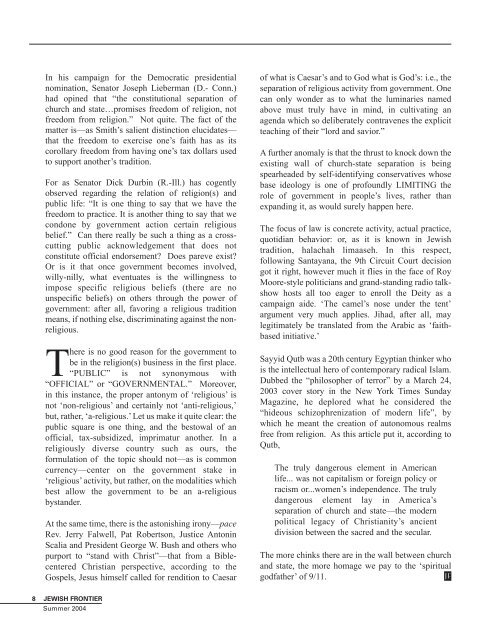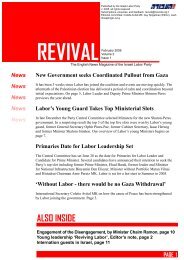Create successful ePaper yourself
Turn your PDF publications into a flip-book with our unique Google optimized e-Paper software.
In his campaign for the Democratic presidential<br />
nomination, Senator Joseph Lieberman (D.- Conn.)<br />
had opined that “the constitutional separation of<br />
church and state…promises freedom of religion, not<br />
freedom from religion.” Not quite. The fact of the<br />
matter is—as Smith’s salient distinction elucidates—<br />
that the freedom to exercise one’s faith has as its<br />
corollary freedom from having one’s tax dollars used<br />
to support another’s tradition.<br />
For as Senator Dick Durbin (R.-Ill.) has cogently<br />
observed regarding the relation of religion(s) and<br />
public life: “It is one thing to say that we have the<br />
freedom to practice. It is another thing to say that we<br />
condone by government action certain religious<br />
belief.” Can there really be such a thing as a crosscutting<br />
public acknowledgement that does not<br />
constitute official endorsement Does pareve exist<br />
Or is it that once government becomes involved,<br />
willy-nilly, what eventuates is the willingness to<br />
impose specific religious beliefs (there are no<br />
unspecific beliefs) on others through the power of<br />
government: after all, favoring a religious tradition<br />
means, if nothing else, discriminating against the nonreligious.<br />
There is no good reason for the government to<br />
be in the religion(s) business in the first place.<br />
“PUBLIC” is not synonymous with<br />
“OFFICIAL” or “GOVERNMENTAL.” Moreover,<br />
in this instance, the proper antonym of ‘religious’ is<br />
not ‘non-religious’ and certainly not ‘anti-religious,’<br />
but, rather, ‘a-religious.’ Let us make it quite clear: the<br />
public square is one thing, and the bestowal of an<br />
official, tax-subsidized, imprimatur another. In a<br />
religiously diverse country such as ours, the<br />
formulation of the topic should not—as is common<br />
currency—center on the government stake in<br />
‘religious’ activity, but rather, on the modalities which<br />
best allow the government to be an a-religious<br />
bystander.<br />
At the same time, there is the astonishing irony—pace<br />
Rev. Jerry Falwell, Pat Robertson, Justice Antonin<br />
Scalia and President George W. Bush and others who<br />
purport to “stand with Christ”—that from a Biblecentered<br />
Christian perspective, according to the<br />
Gospels, Jesus himself called for rendition to Caesar<br />
of what is Caesar’s and to God what is God’s: i.e., the<br />
separation of religious activity from government. One<br />
can only wonder as to what the luminaries named<br />
above must truly have in mind, in cultivating an<br />
agenda which so deliberately contravenes the explicit<br />
teaching of their “lord and savior.”<br />
A further anomaly is that the thrust to knock down the<br />
existing wall of church-state separation is being<br />
spearheaded by self-identifying conservatives whose<br />
base ideology is one of profoundly LIMITING the<br />
role of government in people’s lives, rather than<br />
expanding it, as would surely happen here.<br />
The focus of law is concrete activity, actual practice,<br />
quotidian behavior: or, as it is known in Jewish<br />
tradition, halachah limaaseh. In this respect,<br />
following Santayana, the 9th Circuit Court decision<br />
got it right, however much it flies in the face of Roy<br />
Moore-style politicians and grand-standing radio talkshow<br />
hosts all too eager to enroll the Deity as a<br />
campaign aide. ‘The camel’s nose under the tent’<br />
argument very much applies. Jihad, after all, may<br />
legitimately be translated from the Arabic as ‘faithbased<br />
initiative.’<br />
Sayyid Qutb was a 20th century Egyptian thinker who<br />
is the intellectual hero of contemporary radical Islam.<br />
Dubbed the “philosopher of terror” by a March 24,<br />
2003 cover story in the New York Times Sunday<br />
Magazine, he deplored what he considered the<br />
“hideous schizophrenization of modern life”, by<br />
which he meant the creation of autonomous realms<br />
free from religion. As this article put it, according to<br />
Qutb,<br />
The truly dangerous element in American<br />
life... was not capitalism or foreign policy or<br />
racism or...women’s independence. The truly<br />
dangerous element lay in America’s<br />
separation of church and state—the modern<br />
political legacy of Christianity’s ancient<br />
division between the sacred and the secular.<br />
The more chinks there are in the wall between church<br />
and state, the more homage we pay to the ‘spiritual<br />
godfather’ of 9/11.<br />
JF<br />
8 JEWISH FRONTIER<br />
Summer 2004




